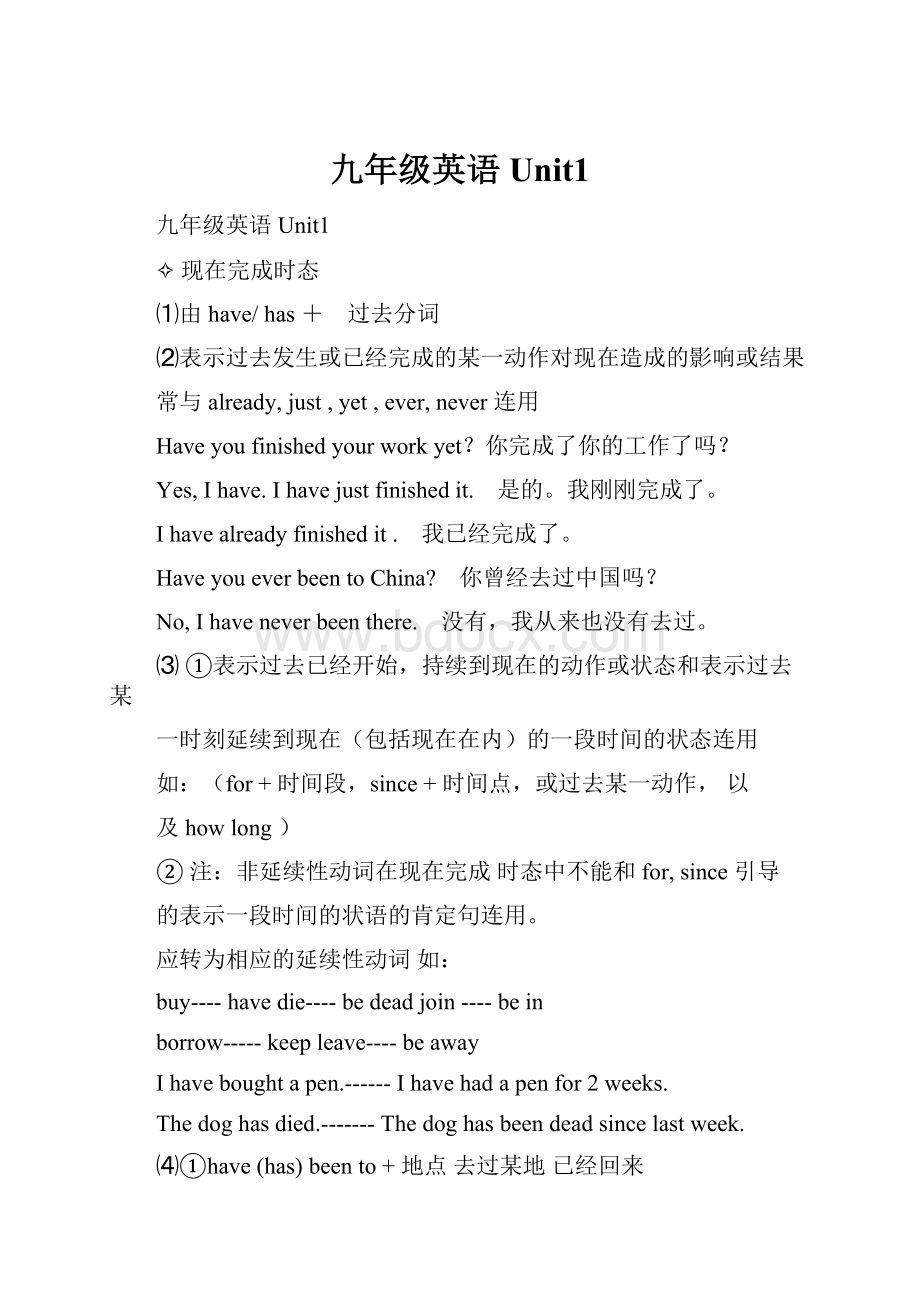九年级英语Unit1.docx
《九年级英语Unit1.docx》由会员分享,可在线阅读,更多相关《九年级英语Unit1.docx(67页珍藏版)》请在冰豆网上搜索。

九年级英语Unit1
九年级英语Unit1
✧现在完成时态
⑴由have/has+ 过去分词
⑵表示过去发生或已经完成的某一动作对现在造成的影响或结果
常与already,just,yet,ever,never连用
Haveyoufinishedyourworkyet?
你完成了你的工作了吗?
Yes,Ihave.Ihavejustfinishedit. 是的。
我刚刚完成了。
Ihavealreadyfinishedit. 我已经完成了。
HaveyoueverbeentoChina?
你曾经去过中国吗?
No,Ihaveneverbeenthere. 没有,我从来也没有去过。
⑶①表示过去已经开始,持续到现在的动作或状态和表示过去某
一时刻延续到现在(包括现在在内)的一段时间的状态连用
如:
(for+时间段,since+时间点,或过去某一动作,以
及howlong)
②注:
非延续性动词在现在完成时态中不能和for,since引导
的表示一段时间的状语的肯定句连用。
应转为相应的延续性动词如:
buy----havedie----bedeadjoin----bein
borrow-----keepleave----beaway
Ihaveboughtapen.------Ihavehadapenfor2weeks.
Thedoghasdied.-------Thedoghasbeendeadsincelastweek.
⑷①have(has)beento+地点去过某地已经回来
②have(has)goneto+地点去了某地没有回来
③havebeenin+地点一直呆在某地没有离开过如:
ShehasbeentoShanghai.她去过上海。
(已经回来)
ShehasgonetoShanghai.她去了上海。
(没有回来)
ShehasbeeninShanghaifor2days.
她呆上海两天了。
(没有离开过上海)
✧howtoswim怎样游泳
不定式与疑问词连用:
动词不定式可以和what,which,how,where,when等引导的疑问句连用,构成不定式短语。
如:
Thequestioniswhentostart.问题是什么时候开始。
Idon’tknowwheretogo.我不知道去哪。
✧系动词不能独立作谓语,要和表语一起构成谓语。
常用的连系动词有:
look,feel,be,become,get,turn,smell,taste,stay(保持),kept等。
连系动词除be和become等少数词可接名词作表语外,一般都是接形容词。
如:
Theyareveryhappy.Hebecameadoctortwoyearsago.
Shefeltverytired.
✧词汇
1.differentlyadv.differentadj.2.quickadj.quicklyadv.
3.slowadj.slowlyadv.4.easyadj.easilyadv.
5.friendn.朋友friendshipn.友谊
6.importantadj.重要的 unimportant不重要的
7.learnv.学习 learnern.学习者
8.impressv.使感动 impressed adj.感动的
9.pronouncev.发音 pronunciationn.发音
10.helpv.帮助 helpfuladj.有帮助的
11.sciencen.科学 scientistn.科学家
12.happyadj.高兴的 unhappyadj.不高兴的
13.disagreementn.不同意见 agreementn.同意
disagreev. 不同意 agreev.同意
✧短语、句型
1.bydoing2.talkabout,talkto,talkwith
3.提建议的句子4.alot,alotof,lotsof5.too…to…
6.aloud,loud,loudly7.not…atall
8.be/getexcitedaboutsth./doingsth.
9.endupdoing10.firstofall,tobeginwith,lateron
11.also,either,too12.makemistakes
13.laughat14.takenotes
15.enjoydoing16.nativespeaker
17.makeup18.oneof…
19.it’s+形容词+todosth.20.practicedoing
21.decidetodo22.unless
23.dealwith24.worryaboutsth./sb.
25.beangrywithsb.26.perhaps,maybe
27.goby28.seesb./sth.doing
29.eachother30.regard…as…
31.toomany,toomuch,muchtoo
32.change…into…33.withthehelpofsb.
34.compare…to…35.instead,insteadof
36.tryone’sbesttodo37.lookup
1.by+doing通过……方式 如:
bystudyingwithagroup
by还可以表示:
“在…旁”、“靠近”、“在…期间”、“用、”
“经过”、“乘车”等
如:
Ilivebytheriver.
Ihavetogobackbyteno’clock.
Thethiefenteredtheroombythewindow.
Thestudentwenttoparkbybus.
2.talkabout谈论,议论,讨论 如:
Thestudentsoftentalkaboutmovieafterclass.学生们常常在课后讨论电影。
talktosb.===talkwithsb.与某人说话
3.提建议的句子:
①What/howabout+doingsth.?
如:
What/Howaboutgoingshopping?
②Whydon’tyou+dosth.?
如:
Whydon’tyougoshopping?
③Whynot+dosth.?
如:
Whynotgoshopping?
④Let’s+dosth.如:
Let’sgoshopping
⑤Shallwe/I+dosth.?
如:
Shallwe/Igoshopping?
4.alot许多常用于句末 如:
Ieatalot.我吃了许多。
alotof许多 ==lotsof许多 常与名词连用
5.too…to太…而不能常用的句型too+adj./adv.+todosth.
如:
I’mtootiredtosayanything.我太累了,什么都不想说。
6.aloud,loud与loudly的用法
三个词都与"大声"或"响亮"有关。
①aloud是副词,重点在出声能让人听见,但声音不一定很大,
常用在读书或说话上。
通常放在动词之后。
aloud没有比较级
形式。
如:
Hereadthestoryaloudtohisson.
他朗读那篇故事给他儿子听。
②loud可作形容词或副词。
用作副词时,常与speak,talk,
laugh等动词连用,多用于比较级,须放在动词之后。
如:
Shetoldustospeakalittlelouder.她让我们说大声一点。
③loudly是副词,与loud同义,有时两者可替换使用,但往往
含有令人讨厌或打扰别人的意思,可位于动词之前或之后。
如:
Hedoesnottalkloudlyorlaughloudlyinpublic.
他不当众大声谈笑。
7.not…atall一点也不根本不如:
Ilikemilkverymuch.Idon’tlikecoffeeatall.
我非常喜欢牛奶。
我一点也不喜欢咖啡。
not经常可以和助动词结合在一起,atall则放在句尾
8.be/getexcitedaboutsth.===
be/getexcitedaboutdoingsth.===
beexcitedtodosth.对…感兴奋如:
Iam/getexcitedaboutgoingtoBeijing.===
IamexcitedtogotoBeijing.我对去北京感到兴奋。
9.①endupdoingsth终止做某事,结束做某事如:
Thepartyendedupsinging.晚会以唱歌而结束。
②endupwithsth.以…结束如:
Thepartyendedupwithhersinging.晚会以她的歌唱而告终。
10.firstofall首先
.tobeginwith一开始
lateron后来、随
11.also也、而且(用于肯定句)常在句子的中间
either也(用于否定句)常在句末
too也(用于肯定句)常在句末
Iamalsoastudent.我也是一个学生
Iamastudenttoo.我也是一个学生。
Iamnotastudenteither.我也不是一个学生。
12.makemistakes犯错如:
Ioftenmakemistakes.我经常犯错。
makeamistake犯一个错误如:
Ihavemadeamistake.
我已经犯了一个错误。
13.laughatsb.笑话;取笑(某人)如:
Don’tlaughatme!
不要取笑我!
14.takenotes做笔记,做记录
15.enjoydoingsth.喜欢做…乐意做…如:
Sheenjoysplayingfootball.她喜欢踢足球。
enjoyoneself过得愉快如:
Heenjoyedhimself.他过得愉快。
16.nativespeaker说本族语的人
17.makeup组成、构成
18.oneof+(the+形容词最高级)+名词复数形式…其中之一
如:
Sheisoneofthemostpopularteachers.
她是最受欢迎的教师之一。
19.It’s+形容词+(forsb.)todosth.(对于某人来说)做某事…
如:
It’sdifficult(forme)tostudyEnglish.
对于我来说学习英语太难了。
句中的it是形式主语,真正的主语是tostudyEnglish
20.practicedoing练习做某事如:
SheoftenpracticespeakingEnglish.她经常练习说英语。
21.decidetodosth.决定做某事如:
LiLeihasdecidedtogotoBeiJing.李雷已经决定去北京。
22.unless假如不,除非引导条件状语从句
如:
Youwillfailunlessyouworkhard..假如你不努力你会失败。
Iwon’twriteunlesshewritesfirst.除非他先写要不我不写
23.dealwith处理如:
Idealtwithalotofproblem.
24.worryaboutsb./sth.担心某人/某事
如:
Motherworriedabouthersonjustnow.
妈妈刚才担心她的儿子。
25.beangrywithsb.对某人生气如:
Iwasangrywithher.我对她生气。
26.perhaps===maybe也许
27.goby(时间)过去如:
Twoyearswentby.两年过去了。
28.seesb./sth.doing看见某人正在做某事强调正在发生
seesb./sth.do看见某人在做某事如:
如:
Shesawhimdrawingapictureintheclassroom.
她看见他正在教室里画画。
29.eachother彼此
30.regard…as…把…看作为….如:
TheboysregardedAnnaasafool.这些男孩把安娜看成傻瓜。
31.toomany 太多 修饰可数名词 如:
toomanygirls
toomuch 太多 修饰不可数名词如:
toomuchmilk
muchtoo 太 修饰形容词如:
muchtoobeautiful
32.change… into… 将…变为…
如:
Themagicianchangedthepenintoabook.
这个魔术师将这支笔变为一本书。
33.withthehelpofsb.==withone’shelp在某人的帮助下
如:
withthehelpofLiLei==withLiLei’shelp
在李雷的帮助下
34.compare…to… 把…与…相比
如:
CompareyoutoAnna,youarelucky.
你和安娜相比,你是幸运的。
35.instead代替 用在句末,副词(字面上常不译出来)
insteadofsth./doingsth.代替,而不是用在句中,动词
如:
LastsummerIwenttoBeijing.ThisyearI’mgoingtoShanghaiinstead.去年夏天我去北京,今年我将要去上海。
Iwillgoinsteadofyou.我将代替你去。
Hestayedathomeinsteadofgoingswimming.
他呆在家里而不是去游泳。
36.tryone’sbesttodo尽某人的最大能力去做某事
如:
Shetriedherbesttofinisheverywork.
37.lookup查阅(字典)
如:
Ifyoudon’tunderstandtheword,youcanlookupthiswordinthedictionary.如果你不理解这个单词,你可以在字典中查阅
当遇到代词时,应把代词放在中间如:
lookit/themup
九年级英语Unit2
词汇:
1.deathn.死亡 deadadj.死的 diev. 死
2.decisionn 决定 decidev.决定
3.luckn.幸运 luckyadj.幸运的 luckilyadv.幸运地
短语、句型:
2.usedtodosth. 3.playthepiano
4.beinterestedinsth./doingsth. 5.interested与interesting
6.still7.thedark8.beterrifiedofsth./doingsth.
9.on与off10.walkto11.和12.spend、pay和take
13.chatwithsb.14.worryaboutsb./sth.与beworriedaboutsb./sth. 15.allthetime16.takesb.to+地方
17.hardly 18. miss 19.inthelastfewyears
20.bedifferentfrom与bethesameas21.trytodo
22.makesb./sth+adj./do23.moveto
24.itseemsthat25.helpsb.withsth.与helpsb.(to)dosth.
26.fifteen-year-old27.can’taffordtodo
28.as…assb.can29.getintotroublewith
30.intheend31.makeadecision
32.toone’ssurprise33.takeprideinsth.
34.payattentionto35.beableto与can
36.giveupdoing37.nomore38.gotosleep
✧反意疑问句
反意疑问句的提问部分的结构是:
助动词(be/will/do/have)/情态动词(can/could等)+主语
①肯定陈述句+否定提问 如:
Lilyisastudent,isn’tshe?
LilywillgotoChina,won’tshe?
②否定陈述句+肯定提问如:
Shedoesn’tcomefromChina,doesshe?
Youhaven’tfinishedhomework,haveyou?
③提问部分用代词而不用名词Lilyisastudent,isn’tshe?
④陈述句中含有否定意义的词,如:
little,few,never,nothing,hardly等。
其反意疑问句用肯定式。
如:
HeknowslittleEnglish,doeshe?
他一点也不懂英语,不是吗?
Theyhardlyunderstoodit,didthey?
他们几乎不明白,不是吗?
2.usedtodosth.过去常常做某事
否定形式:
didn’tusetodosth./usednottodosth.
如:
Heusedtoplayfootballafterschool.放学后他过去常常踢足球。
Didheusetoplayfootball?
Yes,Idid.No,Ididn’t.
Hedidn’tusetosmoke.他过去不吸烟。
3.playthepiano 弹钢琴
4.①beinterestedinsth.对…感兴趣
②beinterestedindoingsth.对做…感兴趣
如:
Heisinterestedinmath,butheisn’tinterestedinspeaking
English.他对数学感兴趣,但是他对说英语不感兴趣。
5.interestedadj.感兴趣的,指人对某事物感兴趣,往往主语是人
interestingadj.有趣的,指某事物/某人具有趣味,主语往往是物
6.still仍然,还 用在be 动词的后面 如:
I’mstillastudent.
用在行为动词的前面 如:
Istilllovehim.
7.thedark天黑,晚上,黑暗
8.害怕…beterrifiedofsth.如:
Iamterrifiedofthedog.
beterrifiedofdoingsth.如:
Iamterrifiedofspeaking.
9.on副词,表示(电灯、电视、机械等)在运转中/打开,
其反义词off. withthelighton灯开着
10.walktosomewhere步行到某处walktoschool步行到学校
11. spend动词,表示“花费金钱、时间”
①spend…onsth.在某事上花费(金钱、时间)
②spend…doingsth.花费(金钱、时间)去做某事 如:
Hespendstoomuchtimeonclothes.他花费太多的时间在衣着上。
Hespent3monthsbuildingthebridge.他花费了三个月去建这座桥。
payfor花费
如:
Ipay10yuanforthebook.我花了10元买这本书。
12.take动词 有“花费”的意思 常用的结构有:
takesb.…todosth.如:
Ittakesmeadaytoreadthebook.
13.chatwithsb.与某人闲聊 如:
Iliketochatwithhim.
我喜欢和他聊天。
14.worryaboutsb./sth.担心某人/某事 worry是动词
beworriedaboutsb./sth.担心某人/某事 worried是形容词
如:
Don’tworryabouthim.不用担心他。
Motherisworriedaboutherson.妈妈担心他的儿子。
15.allthetime一直、始终
16.takesb.to+地方 送/带某人去